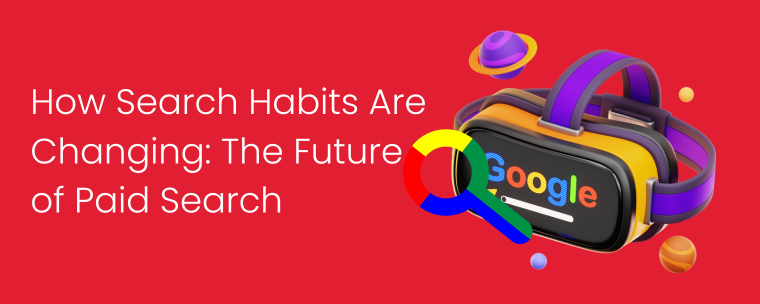Paid Search Campaign
How Search Habits Are Changing: The Future of Paid Search
The future of paid search is at stake, with new updates bringing a spectrum of changes and transformations in search fields. Hence, for marketers, understanding these changes will be the blade to cut ahead of the competition. Take a closer look at the evolution of search habits.

The Evolution of Search Habits
1. Voice Search
Just like how EVs with new, cutting-edge technology have shaken up the driver’s experience, so have Voice-activated assistants like Siri, Alexa, and Google Assistants in how users search for information. Voice search queries tend to be longer and more conversational compared to traditional text-based searches. For instance, instead of typing “best Italian restaurant NYC,” users might ask, “What is the best Italian restaurant in New York City?” This shift requires marketers to optimize for natural language and question-based queries
2. Mobile Search
What once was the turf of a computer is now taken over by a much smaller hand-held smartphone device. As per recent statistics, more than 60% of all searches are conducted on mobile devices. This figure alone should be enough to show who’s boss.
Since mobile searches, are often location-based, with users seeking immediacy in their quest for solutions, marketers have shifted towards ‘Local SEO’, making sure that their ads are designed fit for mobile consumption.
3. Visual Search
The latest developments in search is the Visual search, with platforms like Google Lens and Pinterest leading the charge. Users can now search using images instead of text, changing the way they interact with search engines. For example, snapping a picture of a product can lead to search results for similar items.
This means marketers should now prioritize on optimizing their visual content and use high-quality images to capitalize on the green pastures.
4. Personalization
Search engines are becoming more sophisticated in personalizing results based on user behavior, preferences, and past searches. By analyzing data such as search history, location, device type, and engagement with previous results, search engines like Google can customize the results to better match the user’s specific interests and needs.
For example, if a user frequently searches for vegan recipes, their future searches for recipes are more likely to prioritize vegan options. This approach not only improves user satisfaction but also increases the likelihood of users engaging with the content presented to them.
5. AI and machine learning
By analyzing vast amounts of data, including user behaviour and preferences, for predicting and prioritizing what users are most likely to find useful, AI and machine learning are enabling search engines to deliver highly relevant and personalized content.
As a result, search experiences become more intuitive, efficient, and tailored to individual needs, enhancing user satisfaction and engagement.
What is Paid Search Exactly?
Let’s backtrack to understand what paid search is before getting deep into the nitty gritty. Paid search is where advertisers pay search engines to display ads of their products or services, typically appearing at the top or the bottom of the search results pages, targeted based on specific keywords relevant to the advertiser’s products or services.
How is the evolution impacting Paid Search?
As search habits evolve, so too must keyword strategies. With the increase in voice and conversational search, long-tail keywords are becoming more important.
This means that advertisers should focus more on phrases and questions that mirror natural speech patterns and integrate local keywords that can enhance visibility for mobile users searching for nearby locations
The format of paid search ads is also adapting to new search behaviors. Responsive search ads, which automatically adjust to fit different devices and screen sizes, are becoming essential. Video ads and interactive content are gaining traction as users seek more engaging experiences. Marketers should experiment with various ad formats to find what resonates best with their audience.
User experience (UX) is increasingly influencing search rankings and ad performance. Search engines prioritize websites that offer fast load times, easy navigation, and relevant content. Ads that align with a positive UX are more likely to succeed. Marketers should focus on creating seamless and enjoyable user experiences to improve their search engine marketing outcomes.
What the future holds for paid search?
With increased focus on personalization and automation, with technology like ai and machine learning, the future of paid search would definitely take the path towards highly relevant ads highly suited to user behaviour and preferences. As voice, mobile, and visual searches continue to rise, marketers will need to optimize their strategies for these formats to maintain visibility and engagement in a rapidly evolving digital landscape.
Recent Posts
- The GEO Playbook: How to Rank in the Age of Generative AI
- Building a Brand Identity: A Step-by-Step Guide from Design to Execution
- From SEO to GEO: How Businesses Must Adapt to AI-Powered Search
- Instagram, YouTube & LinkedIn Updates Every Business Owners/Entrepreneur Must Know in 2026
- Top AI Tools Business Owners Should Know About for Digital Marketing in 2026



